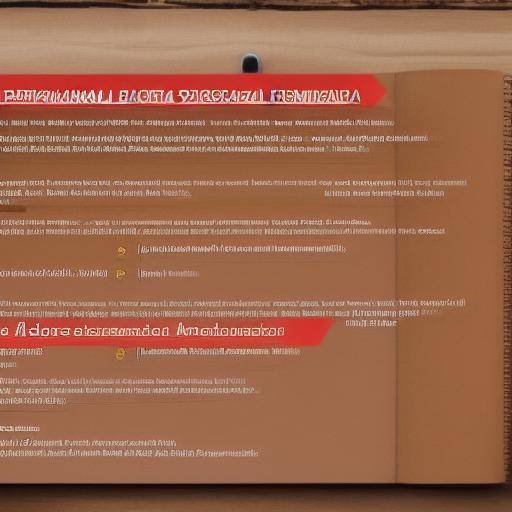
Introduction
Have you ever felt overwhelmed by the amount of tasks you must perform daily? Would you like to have a greater organization in your personal and work life? If so, then setting daily routines based on the weekly review can be the solution you're looking for. In this article, we will explore in detail how the implementation of these routines can optimize your time, reduce stress and improve your productivity. Join us on this journey to a more organized and efficient life.
History and Background
Daily routines and weekly review have a long history of helping people improve their productivity and well-being. From the times of the ancient Greek philosophers to the modern era, the idea of establishing routines to maintain order and effectiveness has been valued throughout the world.
In the context of personal organization, the idea of a weekly review of outstanding tasks and setting short-term goals has been gaining relevance over time. With the rise in time management and personal productivity, the weekly review has become a key tool for the strategic planning of daily activities.
Analysis in Deep
Benefits of Daily Routines and Weekly Review
Daily routines provide structure and predictability in our lives, which reduces stress and anxiety. By establishing a sequence of recurrent activities, we create healthy habits that increase our efficiency and emotional well-being.
The weekly review, on the other hand, gives us the opportunity to analyze our short-term goals and priorities. By reviewing what we have achieved and defining our goals for the next week, we can optimize our effectiveness and focus our efforts on what really matters.
Implementation Challenges
One of the most common challenges in establishing daily routines and conducting weekly reviews is resistance to change. Many people feel uncomfortable breaking with their established patterns and adopting new practices. However, with proper patience and perseverance, it is possible to overcome this resistance and enjoy the long-term benefits.
Comprehensive review
Practices and Best Practices
To implement daily routines based on the weekly review effectively, it is essential to establish realistic and flexible schedules. By assigning specific moments for different activities such as exercise, work, rest and leisure, we can optimize our time and maximize our productivity.
Perspectives of Experts and Industry Concerns
Time management experts and personal organization agree that daily routines and weekly review are essential for a balanced and satisfactory life. These methods provide a clear road map and allow quick adjustments when unforeseen arises.
Comparative analysis
There are significant similarities between daily routines and weekly review, as both approaches seek to provide structure and clarity in our lives. However, there are also differences in the frequency and degree of detail in planning. The combination of both practices can result in a highly effective time management strategy.
Practical Tips and Accessible Recommendations
For those who want to implement daily routines based on the weekly review, it is recommended to start with small steps and set attainable goals. It is important to be flexible and to adjust routines according to changing needs. In addition, self-care and stress management are key aspects of maintaining a healthy balance.
Conclusions and FAQs (FAQs)
Conclusions
In short, establishing daily routines based on the weekly review can provide significant benefits in terms of efficiency, well-being and personal realization. By adopting these approaches, we can improve our productivity, reduce stress and find a greater balance in our daily lives.
Frequently asked questions
1. Why is it important to establish daily routines?
Daily routines provide structure and predictability, which helps to reduce stress, increase efficiency and improve emotional well-being.
2. What is the role of the weekly review in the personal organization?
The weekly review allows us to reflect on our short-term goals and priorities, which helps us to adjust our activities and maximize our productivity.
3. How can I overcome resistance to change by establishing new daily routines?
The key to overcoming resistance to change is patience and perseverance. Starting with small changes and celebrating achievements gradually can make the transition smoother.
4. Should I be strict with my daily routines or allow some flexibility?
It is important to find a balance between structure and flexibility. Daily routines should provide a framework, but they should also allow adjustments according to changing needs.
5. Why is it useful to compare daily routines and weekly review?
Compare both practices allow us to better understand how to optimize our time and maximize our productivity by combining the best of both approaches.
6. What are the long-term benefits of establishing daily routines based on the weekly review?
Long-term benefits include greater efficiency, a sense of personal achievement and a significant reduction in stress, which contributes to better quality of life.
In conclusion, establishing daily routines based on the weekly review is a powerful strategy to improve personal organization and productivity. With the careful implementation of these practices and the willingness to adapt to changes, we can transform our daily lives, reduce stress and achieve a greater balance in our activities. We hope that this article has provided valuable and useful information to make the most of your daily routines and your weekly review.
































